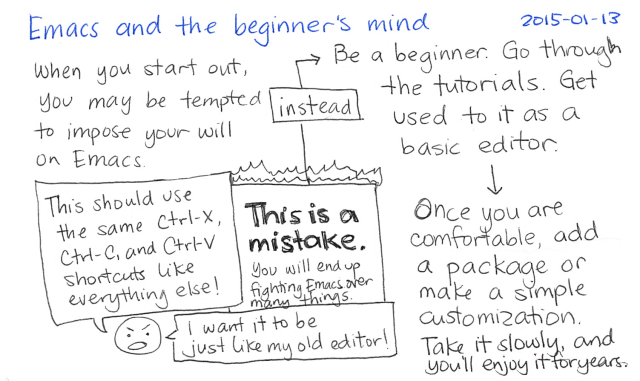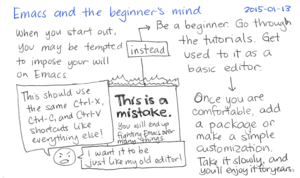Getting started with Emacs? Empty your cup
Posted: - Modified: | emacsHere's something I've realized. To learn Emacs well, try emptying your cup. This is the story as told on the C2 wiki:
A master was trying to explain something to a student. Now this student was not a brand new student, but a senior student who had learned many things. He had knowledge and experience aplenty to draw upon. But each time the master tried to explain something new to the student, the student kept trying to hold it up against his own notions of the way the world is and how it ought be, and he was unable to see the lessons in what the master was trying to teach him.
Finally, the master poured a full serving of tea into his own cup, and into the cup of the student. Then he told the student he wanted to give to him some of the tea from his own cup. He began pouring tea from his cup into the student's cup, but the student's cup was already full, and all the tea from the master's cup spilled out over the cup onto the surface below.
The student said, "Master, you can't pour anything into my cup until I empty it to make room for what you are trying to give me.", and the master replied "Yes I know." "And I can't give you any new thoughts or ideas or perspectives on life's lessons until you clear out some thoughts that are already teeming in your mind to make room for what I have to teach you." Then the master paused for a brief moment, meeting the student's eyes with his own knowing look and calmly but sternly said: " If you truly seek understanding, then first, empty your cup!"
The student pondered for a moment with a look of absolute bewilderment. Then a look of enlightenment came over him, followed by a smile, and a look of receptiveness. The master started to explain again, and this time the student saw what the master was trying to say.

It's natural to get frustrated when you expect something should work a particular way and it doesn't, or you're used to working quickly and you have to slow down. "Why can't I use Ctrl-X to cut? Why is it called 'killing text'? Why doesn't it work like __?" I know what that's like; even after years of using Emacs, I sometimes still struggle to configure things that people who use other editors take for granted.
Some differences seem easy to address with code you can get on the Net. But if you do that – if you give in to your initial discomfort – you may find yourself fighting more and more of Emacs as you go along, without the skills to properly understand or integrate your changes.
It's better, I think, to approach Emacs as a beginner. Empty your cup and let go of your expectations. Pretend this is your first editor. Go through the tutorial. Start with the basics. Try doing things the Emacs way.
In the beginning, you might feel agonizingly slow. You may need to do this after hours instead of when everyone is counting on you to deliver a time-sensitive project. It's okay to open up Vim or your previous editor so that you can get something done, while you keep learning Emacs in the background. It's okay to use the menu and the toolbar while you get the hang of the most common keyboard shortcuts.
As you become familiar with the system, you learn how to work within it. Slowly configure things. Get used to the changes before you introduce more. Eventually, you'll understand the configuration snippets that other people post. Reading Emacs Lisp is the first step to being able to modify Emacs Lisp, and from there you can learn how to write Emacs Lisp. But you don't have to start knowing that right away. Many people use Emacs for years before writing Emacs Lisp, and many people use it without customizing it.
But if you start learning Emacs by getting frustrated with it and trying to force it to be what you want, you might never get to the point where you can enjoy it and work with it. Be a beginner. Give yourself time and space to learn, even if you feel you're learning slowly. Then, as you improve your understanding and skills, you'll learn how to coax Emacs to fit you even better.


5 comments
Mike F
2015-02-11T18:03:20ZC-x C-c and C-v work as in windows with text selected while running cua-mode. This helped me as a beginner. CUA mode rectangle editing is a reason to switch to emacs in itself.
samrainhan
2015-02-14T14:36:02Zcool, I like "empty your cup"
andx
2015-02-15T02:04:55ZThis is true. I've found all of emacs very discoverable and learnable so far; I think because it was my first editor, and so this makes sense. The thing I cannot get my head arround is using org mode for "organisation". LIke how many todo files do I need? What different types of files do I need? How to organise different ideas in those files? It's been a year and I just don't get it lol :<
sachac
2015-02-20T17:46:32ZHow about starting with one file? http://emacslife.com/baby-s... might have some tips.
andx
2015-02-21T20:04:04ZI did not know you had put all that together sacha; it's a great resource -- thank you!